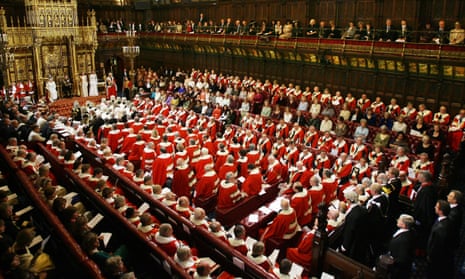From time to time, people of every kind in all walks of life do stupid and sometimes shameful things in their private lives. There is nothing new about this. Most of the time, the damage that such people inflict is miserably concentrated on themselves and their families. Occasionally, however, as in the Profumo case in 1963, or cash for questions 30 years later, the impact goes further. In such a case, one person’s private folly or greed can trigger a cultural or institutional crisis with wider public implications.
The unelected House of Lords has survived intact at the heart of the British constitution for several centuries, in spite of the democratic revolution elsewhere. Given that fact, it would be bold to suggest that the scandal surrounding Lord Sewel will have big repercussions for the upper house. After all, having been caught on video taking cocaine with sex workers, Lord Sewel’s downfall was quickly completed today, when he resigned from the Lords altogether, having earlier quit as one of its senior officers. Ordinarily, that should mean case closed.
Yet these are not ordinary times in British politics, where traditions, parties and leaders are currently held in great public contempt. And the unelected House of Lords is certainly no ordinary institution. So, however tenuous the connection between one peer’s private behaviour and the legislative credibility of the chamber in which he sat, the reality is that Lord Sewel’s disgrace is bad for politics in general, and bad for the Lords in particular.
The government is likely to try to let the dust settle over the summer break. But as David Cameron again made clear today, he wants to appoint a considerable number of new peers as soon as he can get away with it, and certainly in time for parliament’s return. The talk is of about 50 new peers, almost all of them former MPs, and up to 35 of them Conservatives. Mr Cameron repeated that he intends to appoint even more peers later, over and above the 50-odd due soon. There is no way that these appointments will be popular. That is why the Sewel case ought to mean a new approach.
Part of the reason there is a wider problem in this instance is that Lord Sewel was not just any old errant member of the House of Lords. Until this week he was its second most senior officer. Less than two weeks ago, he was responsible for supervising the tightening of standards of behaviour among peers, introducing a motion that means the Lords can expel or suspend a peer who has been found in breach of the House’s code of conduct. By jumping before he was pushed, Lord Sewel narrowly escaped becoming the first person to be caught by the very powers he himself had brought in.
The terms of the new code of conduct underline another wider problem. The code makes much about the need, which is shared by MPs under their own conventions, for peers to behave honourably. Lord Hill – who worked with Lord Sewel on the code – argued on radio today that a code based on behaving honourably was preferable to a provision based on avoiding bringing the House into disrepute. Yet the code itself explains that the meaning of honour “has never been defined and has not needed definition because it is inherent in the culture and conventions of the House”. This is feudal nonsense. Lord Sewel’s alleged behaviour suggests it is ineffective feudal nonsense too.
In an unusually frank passage, this year’s Conservative general election manifesto made clear that House of Lords reform “is not a priority in this parliament”. Yet the prime minister has now made clear that he does in fact have a policy priority towards the Lords.
His priority is to be partisan, and to use his powers of appointment to bring more lobby fodder into the upper house. He intends to pour more and more new Tory peers on to the red benches in an explicit effort to rebalance the second chamber – in which the government does not currently have a majority – in his party’s favour. He will take the number of peers – none of them elected – to around 900. It is a disgraceful and wrong constitutional priority.
There are plenty of good public legislators in the House of Lords. They are not all Lord Sewels. But the political parties are playing with fire if they think Lords reform can be ignored, just when other parts of the constitutional jigsaw, such as the Scottish and English questions, are being so radically recast. The House of Lords must not be left as it is. The Sewel affair should make the government think afresh. If it does, some good will have come from a sordid episode.
